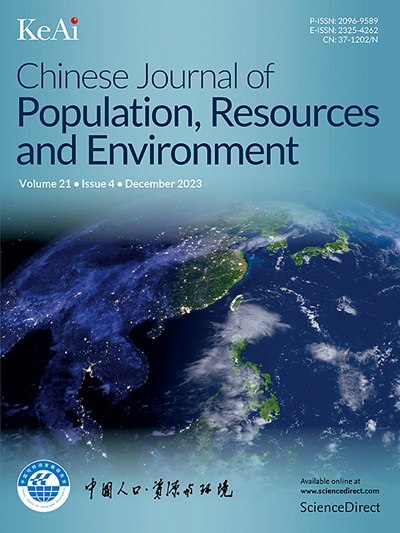Resource constraints and bricolage: The moderating role of entrepreneurs’ creativity cognitive style
IF 4.8
4区 环境科学与生态学
Q2 ENVIRONMENTAL STUDIES
Chinese Journal of Population Resources and Environment
Pub Date : 2025-06-01
DOI:10.1016/j.cjpre.2025.05.010
引用次数: 0
Abstract
This study examines the moderating role of entrepreneurs’ creative cognitive styles in the relationship between resource constraints and bricolage. Drawing on insights from cognitive psychology and entrepreneurial research, we explore how divergent and convergent thinking influence the extent to which entrepreneurs engage in bricolage under resource limitations. Bricolage refers to the creative recombination of available resources to address challenges and seize opportunities, a process often adopted by firms facing financial or knowledge constraints. Yet, individual cognitive differences may determine how effectively entrepreneurs can employ bricolage as a strategic response to scarcity. We propose that divergent thinking—the capacity to generate multiple creative solutions and identify novel resource combinations—strengthens the positive association between resource constraints and bricolage. In contrast, convergent thinking, which emphasizes logical analysis and the pursuit of a single optimal solution, weakens this association. To test these propositions, we collected survey data from 183 entrepreneurs in the United States and employed moderated regression analyses to examine the interactions among cognitive styles, resource constraints, and bricolage behaviors. Our findings reveal that divergent thinking significantly enhances the effect of both financial and knowledge constraints on bricolage, enabling entrepreneurs to creatively leverage limited resources. Conversely, convergent thinking appears to diminish the likelihood of engaging in bricolage when resources are scarce. These results highlight the importance of individual cognitive styles in shaping strategic responses to resource scarcity and contribute to a more nuanced understanding of entrepreneurial bricolage. The study offers practical implications for firms operating in resource-constrained environments by suggesting that enhancing divergent thinking abilities may facilitate more effective resource recombination. Future research should investigate additional cognitive factors and employ longitudinal designs to capture the dynamic nature of entrepreneurial decision-making. These insights open new avenues for further innovative entrepreneurial practices.
资源约束与拼凑:企业家创造力认知风格的调节作用
本研究考察了企业家创造性认知风格在资源约束与拼凑关系中的调节作用。根据认知心理学和创业研究的见解,我们探讨了在资源有限的情况下,发散思维和收敛思维如何影响企业家参与拼凑的程度。Bricolage指的是对现有资源的创造性重组,以应对挑战和抓住机遇,这是面临财务或知识限制的公司经常采用的一种过程。然而,个体认知差异可能决定了企业家如何有效地利用拼凑作为对稀缺性的战略回应。我们认为,发散性思维——产生多种创造性解决方案和识别新资源组合的能力——加强了资源约束和拼凑之间的正相关关系。相反,强调逻辑分析和追求单一最优解的收敛思维削弱了这种联系。为了验证这些命题,我们收集了183名美国企业家的调查数据,并采用适度回归分析来检验认知风格、资源约束和拼凑行为之间的相互作用。我们的研究结果表明,发散思维显著增强了财务和知识约束对拼凑的影响,使企业家能够创造性地利用有限的资源。相反,当资源稀缺时,趋同思维似乎减少了参与拼凑的可能性。这些结果强调了个人认知风格在形成应对资源稀缺的战略反应中的重要性,并有助于更细致地理解创业拼凑。研究结果表明,提高发散性思维能力有助于提高资源重组效率,为资源受限环境下的企业提供了实践启示。未来的研究应该调查更多的认知因素,并采用纵向设计来捕捉创业决策的动态性。这些见解为进一步创新的创业实践开辟了新的途径。
本文章由计算机程序翻译,如有差异,请以英文原文为准。
求助全文
约1分钟内获得全文
求助全文
来源期刊

Chinese Journal of Population Resources and Environment
ENVIRONMENTAL STUDIES-
CiteScore
4.30
自引率
1.10%
发文量
791
审稿时长
79 days
期刊介绍:
The Chinese Journal of Population, Resources and Environment (CJPRE) is a peer-reviewed international academic journal that publishes original research in the fields of economic, population, resource, and environment studies as they relate to sustainable development. The journal aims to address and evaluate theoretical frameworks, capability building initiatives, strategic goals, ethical values, empirical research, methodologies, and techniques in the field. CJPRE began publication in 1992 and is sponsored by the Chinese Society for Sustainable Development (CSSD), the Research Center for Sustainable Development of Shandong Province, the Administrative Center for China's Agenda 21 (ACCA21), and Shandong Normal University. The Chinese title of the journal was inscribed by the former Chinese leader, Mr. Deng Xiaoping. Initially focused on China's advances in sustainable development, CJPRE now also highlights global developments from both developed and developing countries.
 求助内容:
求助内容: 应助结果提醒方式:
应助结果提醒方式:


